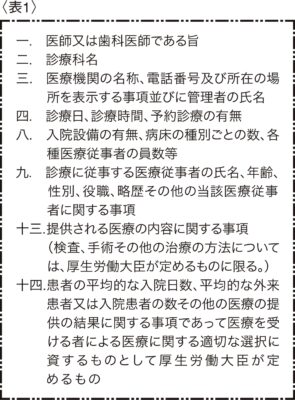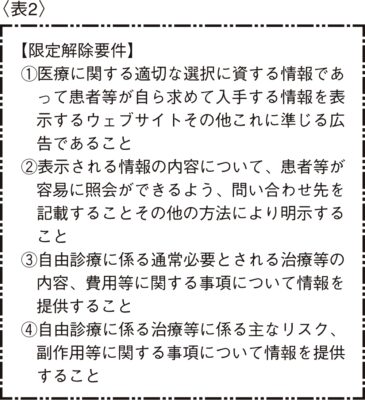ASOURCE®TIMES

執筆
弁護士・医師 渥美坂井法律事務所所属
メディアスホールディングス(株)社外取締役
越後 純子
筑波大学医学専門学群卒業。同大学大学院医学研究科、桐蔭横浜大学法科大学院修了。2010年に弁護士登録し、同年より金沢大学附属病院で院内弁護士としての活動を開始。2015年より虎の門病院に勤務。2022年1月より渥美坂井法律事務所に所属。メディアスホールディングス㈱社外取締役。
医療に関する情報は、人命にかかわることから、広告可能な条件や内容などが厳しく定められています。今回から医療広告に関する法令やガイドライン等の動向について、数回にわたって解説します。

広告は、消費者に対して誤った情報を伝え誤認されることが無いように、不当景品類及び不当表示防止法、いわゆる景表法や、不正競争防止法によって規制されています。医療機関の広告は、それに加えて、より正確な情報を提供する必要性が高いことから、医療法により厳しい規定が設けられています。
具体的には、広告可能な事項が限定されている点です。また、その体裁、作成者を問わず、一定の内容を含んでいる場合に広告とみなされ、広告可能事項以外を記載した場合、違反広告とみなされる可能性があります。例えば、医療者が個人アカウント等で、病院名等を記載して情報発信を行う場合には内容によっては違反広告となる可能性があるので注意が必要です。
一定の要件を満たすと広告事項の限定が解除される仕組みもありますが、広告可能事項やその限定が解除された場合であっても、その内容の正確性や信頼性を担保するために、広告禁止事項が定められています。広告可能なネット医療広告に関しては、パトロール制度や一般消費者からの通報制度もあります。違反広告に対して、行政による立入調査や是正勧告、中止命令等が規定されており、それに従わない悪質な場合は刑事罰が適用になります。
なお、関連する内容として、医療広告に医薬品・医療機器の名称等を掲載しようとする場合には、「医薬品、医療機器等の品質、有効性及び安全性の確保等 に関する法律」(薬機法)の遵守も必要になります。
●広告の定義
広告の定義は、①患者の受診等を誘引する意図があること(誘引性)、②医業もしくは歯科医業を提供する者の氏名もしくは名称又は病院もしくは診療所の名称が特定可能であること(特定性)の双方を満たすものと医療広告ガイドライン1に定められています。
①の判断基準について、ガイドラインでは、情報物の客体の利益を期待して誘引しているかが判断される趣旨が記載されています。例えば新聞記事は、特定の病院が推奨されている内容であっても誘因性は満たさないとされる一方で、同一内容であっても、医療機関側において対価を支払い当該記事の掲載を依頼した場合には、広告に該当することになります。したがって、掲載内容のみならず、掲載媒体や状況を含めて、総合的に判断する必要があります。
●広告可能事項について
法律の条文として定められている広告可能事項の主要な部分の概要をご紹介します〈表1参照〉。

●限定解除の要件
医療広告は、広く不特定多数の目に触れるものを想定しています。しかし、法に定められた情報のみでは、医療機関や治療法の選択に十分ではない場合も想定されます。そのため、患者等が自ら求めて入手する情報については、適切な情報提供が円滑に行われる必要があるとの考え方から、定められた要件〈表2参照〉を満たした場合、広告可能事項の限定を解除し、他の事項を広告することができる旨が定められています。ただし、前述した通り、以下の限定解除要件を満たしたとしても、広告禁止事項に該当する広告は許容されません。

①②は、全ての医療広告に適用され、同時に満たす必要がありますが、③④は自由診療の場合の追加要件です。また、①についてはバナー広告や有償の優先表示広告等の場合、限定解除条件を満たさないとされ、②の問い合わせ先は、Eメールアドレスや電話番号等が例として挙げられています。
次号では、実際に医療機関の広告を作成するにあたって、重要な要素となる広告事項の具体的な内容を解説します。
1 医業若しくは歯科医業又は病院若しくは診療所に関する広告等に関する指針(医療広告ガイドライン)
(https://www.mhlw.go.jp/content/10800000/000927804.pdf)